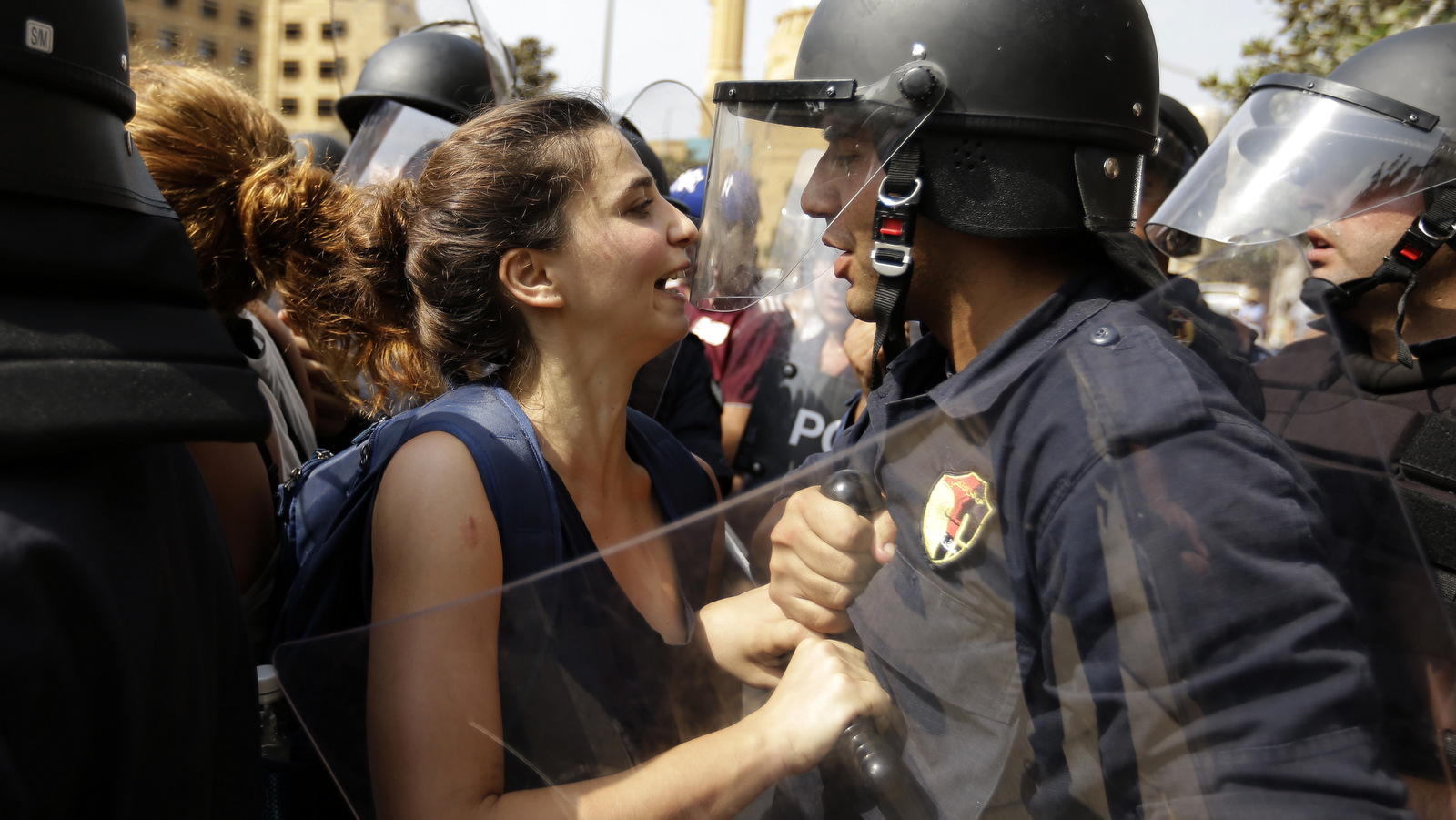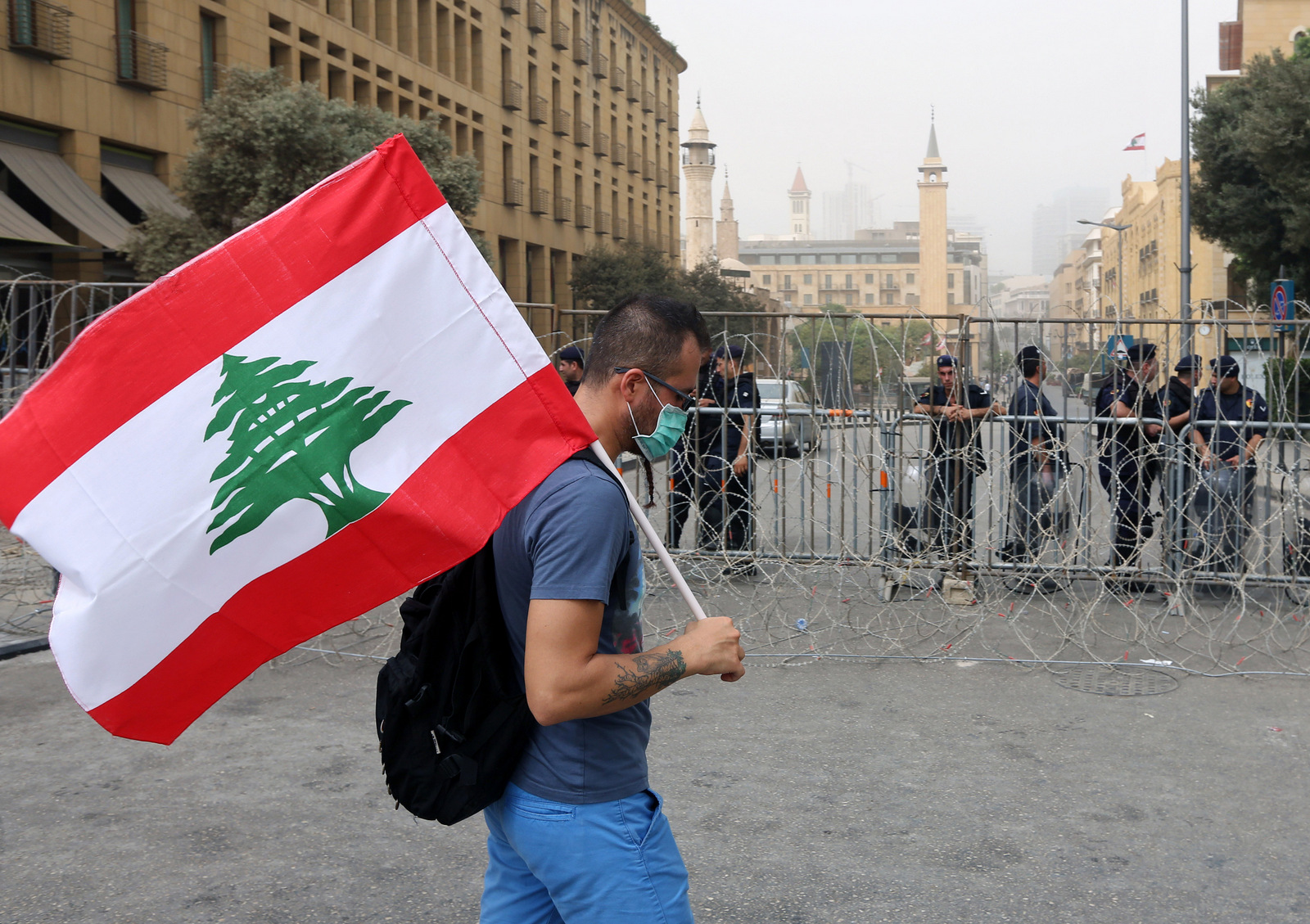By

A Lebanese anti-government protester faces off with a riot policeman on a road leading to the parliament building before a scheduled meeting of political leaders to try to solve the on-going trash crisis and government dysfunction, in downtown Beirut, Lebanon, Wednesday, Sept. 16, 2015. (AP Photo/Hassan Ammar
BEIRUT — Lebanon has been described as “the next domino to have fallen to the grand anti-establishment movement currently playing out in the Middle East” by Jawad Fairouz, a former Bahrain MP for Al Wefaq, Bahrain’s main opposition bloc and the largest political party in the Gulf Cooperation Council.
All eyes are yet again locked on the Middle East, with politicians and experts assessing whether the Levant will be swept up in a fresh revolutionary wave, an awakening reminiscent of protests that kicked off in 2011, or another aborted attempt at democratization.
The Lebanese government’s failure to resolve a garbage disposal crisis and address chronic electricity and water shortages, sparked the You Stink campaign in the capital Beirut in July.
An organic civic protest devoid of a political agenda, the You Stink movement quickly expanded its demands to reflect society’s greater malaise. Samia Nakhoul reported for Reuters on Sept. 7: “The government’s failure to deal with a breakdown in rubbish disposal it knew was coming has become a metaphor for the rot at the heart of a state that, beyond military and security functions, has all but ceased to function.”
Escalations in the campaign have left officials dumbfounded and paralyzed.
What started in Beirut as an expression of public outrage over state corruption and officials’ inability to fulfill their public mandate, appears to have morphed into a revolutionary virus which has proven to be rather contagious and broad in its reach. Lebanese protesters took their grievances directly to the finance ministry on Tuesday, calling not just for economic reform but for institutional change.
With the Lebanese public rising up against the corrupt elite, protesting rabid capitalism and political nepotism, other nations in the region are waiting to see if Beirut will become ground zero for a budding pan-Arab renaissance. Iraqis have already taken a page from Beirut’s revolutionary handbook in challenging the post U.S.-intervention political apparatus.
Speaking to MintPress News, Hussain Haddad, an independent political analyst based in London, who previously served as a policy consultant for former Yemeni President Ali Abdullah Saleh, said, “The Arab Spring movement Western capitals so keenly worked to disappear under military dictatorships could soon be remembered as a mere revolutionary harbinger.” He continued:
“While the Arab Spring failed under the weight of political engineering, this new wave will be much harder to control … mainly because it is Lebanon which is rising. Although Lebanon is somewhat caged by a sectarian divide, its society is vastly secular, its people are well-educated and well-traveled. Lebanon does not move along the same political rules or influences as Egypt, Yemen, Libya or even Bahrain. Lebanon protests could give way to a complete remapping of the region, not just politically, but socially. Lebanon yearns to be a modern Arab nation-state.”
Haddad’s comments echo statements that Bahraini human rights activist Hussain Jawad made to MintPress earlier this year, when he advanced that the underbelly of the 2011 revolutionary movement would lead to a reinvention, or at least a re-definition, of what constitutes a national identity.
If Lebanese took to the streets as a knee-jerk reaction to the piles of foul-smelling rubbish polluting their streets, their ire goes beyond concerns over health and safety. Lebanon’s state institutions have come to reflect the reality of markets and not that of a civil state, leaving the people to fend for themselves at all levels. The most privatized country in the Middle East, Lebanon is a capitalist’s dream. But for the people living there, it has become an unforgiving nightmare.
“Beirut’s rubbish problems are really only the symbolic manifestation of the corruption which has grabbed hold of our country,” Sarah Gerges, a student and activist, told MintPress from Beirut. “This movement is obviously more profound than a complaint about garbage collection! Our officials have completely and utterly failed the people.”
Noting that people’s needs have not been met for years, and there’s not even been much attempt to meet them, Gerges says the people are finally standing up for themselves.
Experts on Middle Eastern politics, such as Kevork Almassian, a regular pundit on RT, are now wondering: Will Lebanon’s “You Stink” campaign ignite a grand Arab political shift and ultimately destroy the remnants of Western imperialism, a legacy which many have blamed for the region’s myriad struggles?
The people versus the establishment

Lebanese riot policemen strike an anti-government protester during clashes on a road leading to the parliament building, in downtown Beirut, Lebanon, Wednesday, Sept. 16, 2015. Lebanese police beat back protesters in downtown Beirut Wednesday ahead of the second session of dialogue between senior politicians, amid widespread anger over the government’s failure to deal with the country’s trash crisis and other political problems. (AP Photo/Bilal Hussein)
Lebanon and Iraq are driving a new narrative four years after Tunisians set fire to the barricades by rising against authoritarianism in 2011, thus inspiring a new movement against nepotism and oligarchic capitalism. But protesters are speaking a wildly different language this time around and their demands are rooted in secularism, fair political representation and social justice.
In stark contrast to the Arab Spring movement, the narrative of which was hijacked by the old political guard, even if in opposition to the actual regime, Lebanon has introduced a new revolutionary tone to the Levant, one which is defiantly non-partisan and proudly secular. Where Egypt, for example, fell prey to the old Islamist narrative under the influence of the Muslim Brotherhood, Lebanese protesters have risen beyond religious, ethnic and social divides to promote their shared values and expectations.
Sarah Gerges, the student and activist, who identifies as a Christian, explained how Beirut’s youth could not care less about religious affiliations:
“Religion is really not a part of this conversation we’re trying to have with our government. We want to make things better for everyone. We all have the same needs and ambitions. At the end of the day we are standing as Lebanese for Lebanon.”
She added: “Politicians are the ones trying to angle this back into a sectarian narrative.”
But if Gerges is hopeful that Lebanon’s “real voice,” as she puts it, will speak louder than political manipulations, Kevork Almassian, the political analyst, remains cautious. He told MintPress:
“Until now there has been no real sign of how and where this movement will go ahead — when framed within a political context, that is. There are currently several powerful blocs which are competing. The most powerful lobby there is, is of course financed by Qatar and backed by the U.S.”
With others entering the fray, however, he says, “It really is anyone’s game right now.”
Lebanon is standing at a critical juncture: the people versus the establishment. And it’s the establishment, as expressed and organized by Western overlords, that intellectuals such as Andre Vltchek have been so intent on denouncing.
Writing for Counterpunch last month, Vltchek proposes:
“[C]ould there be two ‘types’ of protesters at the same place and at the same time? Those who are fighting for a better Lebanon, and those who are paid to fight for sectarianism and for the foreign interests (which in this country is almost the same thing)?”
There lies much of Lebanon’s realpolitik. Lebanon stands in a state of eternal socio-political dichotomy; divided and fragmented along fictional lines to serve those who fear national unity most of all — Western imperialists.
But Lebanese are not drinking the Kool-Aid anymore. As made manifest by the thousands of protesters in the streets of Beirut, Lebanese are just about ready to transform their institutions, so they can finally reflect their political ambitions and a shared national identity based on pluralism.
The death of rabid capitalism?
Beyond the obvious political standoff now holding Lebanon hostage, Hussain Haddad, the independent political analyst in London, believes most media have missed the root cause of the “You Stink” movement — the denunciation of radical capitalism.
He explained:
“Unlike Syria, Egypt and other countries in the region, Lebanon was never exposed to any form of socialism. Lebanon is brutally capitalist in its structures … all public infrastructures are run privately, from health to transport to, of course, garbage collection. And so what you see today as a ‘revolution’ against the establishment is really a denunciation of Western capitalism.”
Haddad’s theory has been echoed by Andre Vltchek. Discussing Lebanon’s devolution into political and institutional paralysis, the intellectual also concludes that capitalism is at the center of the country’s many failures and overlapping political, social, religious, and financial crises. Just as all roads once led to Rome, all hardships now apparently point to capitalism.
“Lebanon is perhaps one of the most capitalist countries on earth. There is almost nothing public, nothing socialist left here, anymore. And the savage capitalism (always prescribed by the Western ‘partners’ for its client states) in Lebanon, as everywhere in the world, simply does not work. … There is plenty of cash in individual’s pockets and in their bank accounts, but almost no money for basic public services. Lamborghinis and Ferraris are racing at night along Cornish, and the Zaitunay Bay Marina puts its counterpart in Abu Dhabi to shame. But most of the city is polluted, crumbling, and desperate.”
While protesters may have not yet formulated their anger anti-capitalist, they appear to be at least denouncing its effects when applied radically and without any form of social filter.
Mustapha Ali, a protester in Beirut, told MintPress: “Lebanon’s capitalism has a lot of beauty, but very little heart.” He says the only real “social” force present in Lebanon has been that put forward by the Hezbollah.
He continued:
“This is not a political statement, this is a reality. The government does not care for refugees, there are no social programs set in place to help those most destitute, everything is run privately according to very capitalistic rules. If not for Hezbollah, Lebanese would have no recourse whatsoever. Much of Hezbollah’s political power has actually drawn from the fact that the organization represents a real alternative to blind profiteering.”
A new brand of nationalism

A Lebanese anti-government protester holds his national flag as Lebanese riot policemen stand guard behind barbed wire that blocks a road leading to the parliament building, during a protest against the on-going trash crisis and government corruption, in downtown Beirut, Lebanon, Wednesday, Sept. 9, 2015. Lebanon’s prime minister says he hopes that political talks between senior politicians will help end government paralysis that has sparked angry street protests. (AP Photo/Bilal Hussein)
Where Egypt, Tunisia and Libya’s democratic aspirations were crushed before they could blossom, the Levant is not playing any faction’s game. Neither financed by any particular group nor sold out to any self-serving agenda, this budding revolution remains organic and popular — at least for the time being.
Going one step further than their Arab Spring revolutionary counterparts, Lebanese are calling for more than just reforms. Many want to wipe the slate clean to better redefine how their institutions should be organized and under what authority.
Marwa Osman, a Beirut-based political analyst on RT for the Middle East and a lecturer and Lebanese International University, told MintPress that she sees Lebanon’s “You Stink” movement as the new cornerstone of a broader conversation on nationalism and, more specifically, neo-pan-Arabism.
“There is a desire today to walk away from Western patronage and tutelage. Lebanese and Arabs in general want to play by their own rules, in accordance with their needs and not within a Western narrative,” Osman said.
“The old rationale can no longer apply, Lebanon is calling for independence and emancipation,” she added. “Lebanon’s cries are the Arab world’s cry, and so, yes, it could catch on!”
Pan-Arabism is a general term which refers to a modern movement in the 1950s and 60s that called for political unification among Arab nations in the Middle East that could yield an Arab political power. The ideology was famously championed by former Egyptian President Gamal Abdel-Nasser as a means of opposing rampant Western imperialism and reclaiming control over the region’s geopolitical structure.
Just as nationalism exploded in Europe in the 19th century, allowing for the formation of new nation-states (Italy and Germany, for example), this new wave of pan-Arab-inspired nationalism could yet reshape the borders painstakingly drawn by the old empires upon the fall of the Ottoman Empire.
But whether in the name of nationalism or against capitalism, Lebanese, like so many across the region, ambition to live in dignity, free to think, work and pray.



